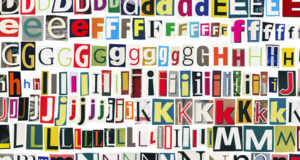We think of unicorns as imaginary, mythical creatures, so you may be surprised to learn they actually exist. In the world of business, it’s the name given to startup companies valued at more than US$1 billion. Venture capitalist Aileen Lee coined ...
More »Strictly speaking: capitals
Capital letters create alternative forms for each character in the Roman alphabet. They help to mark the particular functions of certain words: those that start a sentence or identify proper nouns for persons (e.g. Quentin Bryce) or places (e.g. Australia), ...
More »Strictly speaking: anamorphosis
In classical Greek, anamorphosis meant “transformation”, and was first applied by Renaissance artists to a highly regarded technique of manipulating the perspective on an image. It presented an apparently distorted drawing of an object, which when seen reflected in a ...
More »Strictly speaking: masstige
Masstige is defined as ‘a class of mass-produced, relatively inexpensive goods which are marketed as luxurious or prestigious’. It started out as a specialist marketing term at least 20 years ago, particularly in the beauty and fashion industries, but has ...
More »Strictly speaking: software carpentry
The ancient craft of carpentry still implies hands-on working with wood, using tools such as saw, hammer and nails to join the pieces into weight-bearing structures. So the phrase software carpentry used for an advanced training course makes an odd ...
More »Strictly speaking | Eveninger
The online Oxford English Dictionary has regular updates, and an entry added last month was for the word eveninger. It’s actually quite an old term, first cited in the US in 1932 as an item of women’s evening wear, but ...
More »Strictly Speaking | Snowflake
The meanings of words are constantly changing, with some ending up very far from their original sense. Smug was originally a positive adjective, used for complimenting people on their smart appearance. Obviously this praise went to their heads, giving us ...
More »Binge-watching
The word binge is derived from an old English dialect verb meaning ‘to soak’, hence its association with (alcoholic) liquid over-indulgence. Since its first recorded use in this sense, in the mid-19th century, the range of binge- worthy activities has ...
More »Oblivion? No just off-grid
The phrases off-grid and off-the-grid, in the strict sense of being unconnected to the standard electricity supply, took off in the 1970s when independent sources of energy (that is, solar power for remote locations) were first under discussion. Several decades later, ...
More »When rain lashes concrete on a hot day, Petrichor is the divine essence of stone
Petrichor was coined by CSIRO scientists Isabel Bear and Richard Thomas in 1964, as the name for the oily liquid they had discovered to be released from the earth when moistened by humidity or rain. It’s also the name for ...
More » Campus Review The latest in higher education news
Campus Review The latest in higher education news









